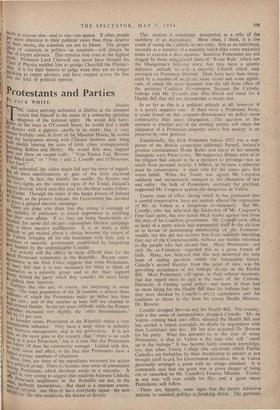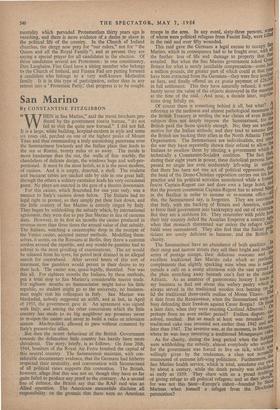Protestants and Parties
JACK WHITE Dublin HE visitor arriving unbriefed in Dublin at the moment would find himself in the midst of a somewhat puzzling eruption of the national spirit. He would find fairy- lifins on the trees in O'Connell Street; he would find a bank flowers with a gigantic candle in its midst, like a very ornate birthday cake, in front of the Mansion House; he would find the lamp-posts strung with Chinese lanterns and hung 1nrittb shields bearing the arms of Irish cities (conspicuously eluding Belfast and .Derry). He would find also, slapped er,e and there on vacant watls: " Vote Fianna Fail, Browne tn:u MacEntee," or " Vote 1 and 2, Costello and O'Donovan, 'fle Gael," leStill unbriefed, the visitor might fall into the error of regard- g all these manifestations as part of the Irish electoral itheunique. In fact, the shields. the candle, the flowers and ioe fairy-lights are the outward signs of An Tostal, Ireland's thurist festival,'which runs this year for the three weeks follow- iiguLaster. Through the midst of this happy picture of Ireland to drive me, as the posters indicate, the Government has decided There a general election campaign. the are some who think that this timing is evidence of e inability of politicians to attach importance to anything but their own affairs. If so, they are being handsomely re- .!_varded; for never did ele.:tors contemplate election campaign iwiiith a more massive indifference. It is, in truth, a little ffi..ult to get excited about a choice between the return of oe Valera, bringing all his old henchmen with him, and a ioalition or minority government -established by bargaining nd, headed by the unpredictable Costello. i For nobody will the choice be more difficult than for the small Protestant community in the Republic. Recent corre- 41,).°,11elence in the Irish Times suggests that soMe Protestants, „! least, feel that it is now necessary for them to think of 41'emselves as a minority group and to put their support it,rm1Y behind the party which they consider the most likely
defend their interests.
Feelings like this are, of course, not surprising in some days. 'The total population of the 26 counties is almost three tlhons. of which the Protestants make up rather less than and around cent.; and of this number at least half are situated in c;'(1aroitrid:DUbliii. In the ten years 1936-46. while the Roman- ferolics increased very slightly, the Other denominations ' i'Y 13 per cent., eo.l..11 broader terms, Protestants in the Republic retain a very anu,sidprable influence. They have large share in industry truu business management, and in the professions. It is not thie. as the story goes in the country, that " there is no such areng as a Poor Protestant," but it is true that the Protestants Lbetter off than the community average. Linked with this, hi_P°111 cause and effect. is the fact that Protestants have a rier standard of education. as a ere, then, are three of the ingredients necessary for action kolo Milical group. There is. besides, that sense of community woullg Protestants which, develops easily in a minority. It aidId be very wrong to suggest that relations between Catholic !hail Pr°1e4ant neighbours in the Republic are not, in the tios'.• Perfectly. harmonious:, But there constant aware- ?f ref :one one . likes , tO have everybody taped—the 'new.
no the new•employee, the doctor or lawyer. This caution is sometimes interpreted as a relic of the snobbery of an ascendancy. More often; I think, it is the result of seeing the Catholic in two roles: first as an individual, secondly as a member of a majority which (like every majority) tends to exercise a slow squeeze. Southern Protestants are not dogged by those exaggerated fears of Rome Rule ' which are the Orangeman's bedtime story; but they have a quietly defensive attitude tov.ards a majority Church which may encroach on Protestant liberties. Their fears have been sharp- ened by a number of incidents, some trivial and some signifi- cant, of which the most`dramatic was the fall from office of the previous Coalition Government he...:ause the Catholic bishops told Mr. Costello that they would not stand for a Health Bill that did not incorporate a means test.
In so far as this is a political attitude at all. however, it is a purely negative one. If there were a Protestant Party, it could found on this common denominator no policy more constructive than mere Orangeism. The question at the moment is whether any of the existing parties will claim the allegiance of a Protestant minority whose first anxiety is to preserve its own position.
Traditionally, the Irish Protestant before 1922 was a sup- porter of the British conne.:tion (although Parnell, Ireland's greatest constitutional Horne Ruler, and many of her notable insurgents were Prote.....tants). He supported Britain even af:er his religion had ceased to be a passport to priVilege—tiot so much from personal loyalty, I believe, as because a minority must be conservative: it must vote fOr the stunts quo, lest worse befall. When the Treaty was signed, Mr. Cosgrave suddenly and mysteriously emerged as the champion of law and order: the bulk of Protestants. surprised but ,gratified. supported Mr. Cosgrave against the dangerous de Valera.
• Twenty years of office, during which he has graduated into a careful conservative, have not entirely effaced the impression of Mr. de Valera as a dangerous revolutionary. But Mr. Costello, who has inherited the leadership of Mr. Cosgrave's Fine Gael party, has two heavy black marks against him from the days of his Coalition government. Mr. Costello. took office as head of a party which had represented itself tb the ele,:tors as in favour of maintaining. membership of the Common- wealth; but this did not re;:train him from suddenly marching Eire out of the Commonwealth, without any further reference to the people who had elc:ted him. Many Protestants—not only the ex-Unionists---regarded this as a gross breach of faith. Many, too, belicved that this step destroyed the only hope of ending partition within the foreseeable future. Costello's second blunder. from this point of view, was his grovelling acceptance of the bishops' decree on the Health Bill. Most Protestants will agree, in their soberer moments, that due regard must be paid to the views .of the Catholic Hierarchy in framing social policy—and many of them had no more liking for the Health Bill than the bishops had----but they were shocked by Costello's abjc-.1 capitulation and his readiness to throw to the lions his young Health Minister, Dr. Browne.
Costello dropped Browne and the Health Bill. The country, with a fine sense of independence, dropped Costello. Mr. de Valera, coming back into office, adopted the Health Bill and has carried it (much amended, no doubt by negotiation with their Lordships) into law. He has also acquired Dr. Browne for his party. What this amounts to, in the eyes of many Protestants, is that de Valera is the man who will " stand up to the bishops." It has become fairly common knowledge, too, that when Trinity College (the university which Dublin Catholics are forbidden by their Archbishop to attend) at last brought itself to ,ask for Government assistance, Mr. de Valera personally arranged a grant with no strings attached. It is Commonly said that the grant was in grave danger of being cut or cancelled by Mr. Costello's Finance Minister. Trinity, at any rate. will vote solidly for Dev, and a great many Protestants' will follow. . • . There are, happily, some .signs, that the ..purely defensive. attitude to national. politics is breaking dOwn. The garrison:
mentality which pervaded Protestantism thirty years ago is vanishing, and there is more evidence of a desire to share in the political life of the country. In the Church of Ireland churches, the clergy, now pray for "our rulers," not for " the Queen and all the Royal Family "; and at present they are saying a special prayer for all candidates in the election. Of those candidates several are Protestants: in one constituency, Dun Laoghaire, Fine Gael have a sitting member who belongs to the Church of Ireland, and Fianna Fail are putting forward a candidate who belongs to a very well-known Methodist family. It is in this type of participation, rather than in any retreat into a ` Protestant Party.' that progress is to be sought.











































 Previous page
Previous page